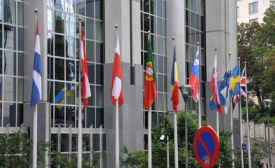europe
There’s been a lot of talk these days that globalization is dead, even reversing — and for good reason. It seems that many of the factors that had been driving globalization have run out of steam. The growth of trade, which has long outpaced the expansion of the world economy, has slowed in recent years. Negotiations to forge a new global-trade agreement, the Doha Round through the World Trade Organization, have been stalled for years.
Josef Joffe is that rare European: a well-known and respected public intellectual, an academic with sinecures at prestigious universities on both sides of the Atlantic, the publisher-editor of the left-leaning German newspaper Die Zeit, and a staunch defender of the United States against reflexive and voguish European anti-Americanism.
Europe's unemployment crisis, now in its sixth year, has had a profound impact on young people across the Continent, and has become among the biggest economic, political and social challenges facing European leaders. Joblessness among young people is at historic highs, forcing many of them to leave their families and countries in search of jobs abroad, to accept temporary and underpaid work that often has little to do with their education and skills, and to readjust their expectations for their future.
European Commission President José Manuel Barroso was right. Had the European Union instead of the United States fallen into partial government shutdown, the world would not have hesitated to use this as an opportunity to berate Europe and its influence as a global leader. The trade in caricatures about the EU is a favourite past time. World leaders stand ready to offer free advice to European governments and institutions that they see as having no capacity to lead.

This piece was co-authored by Jan Melissen.
BRUSSELS - European Commission President José Manuel Barroso was right. Had the European Union instead of the United States fallen into partial government shutdown, the world would not have hesitated to use this as an opportunity to berate Europe and its influence as a global leader.
Sweden and Switzerland have launched a joint campaign to help Chinese tourists tell the two countries apart. While the mix-up isn't solely a problem for the Chinese, it has become a particular issue for those from the Asian nation because both countries' names are written similarly in Mandarin — Ruidian (Sweden) and Ruishi (Switzerland) — and begin with the same symbol.
With a preschooler at home, I don't get out much. I get out to a lot of parks, but art openings or the theater? Unfortunately, never. Still, to be new in Paris, with some of the world's best museums, designer clothes shops, and gallery exhibitions all around me, at least I can partake in a buzzing cultural vibe.







